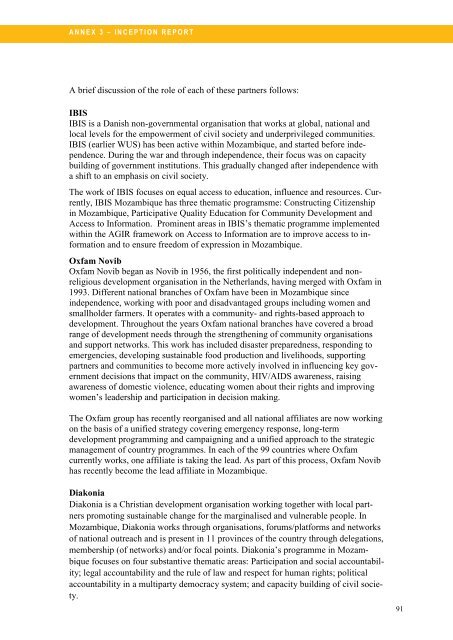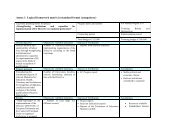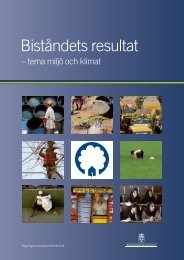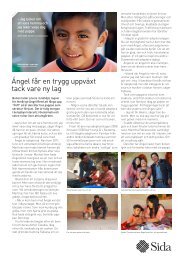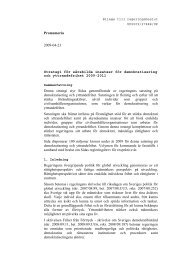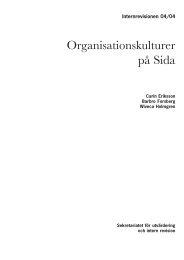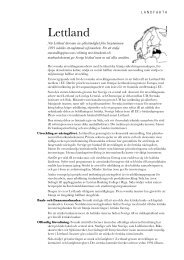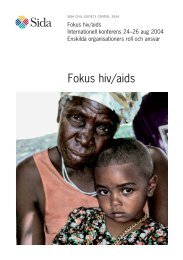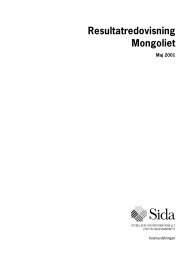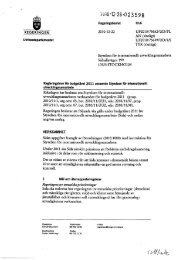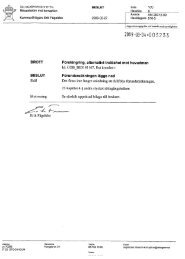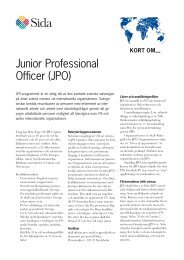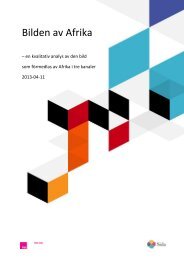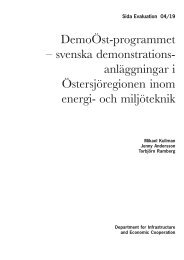Mid-Term Review of the AGIR Programme - Sida
Mid-Term Review of the AGIR Programme - Sida
Mid-Term Review of the AGIR Programme - Sida
Create successful ePaper yourself
Turn your PDF publications into a flip-book with our unique Google optimized e-Paper software.
A N N E X 3 – I N C E P T I O N R E P O R T<br />
A brief discussion <strong>of</strong> <strong>the</strong> role <strong>of</strong> each <strong>of</strong> <strong>the</strong>se partners follows:<br />
IBIS<br />
IBIS is a Danish non-governmental organisation that works at global, national and<br />
local levels for <strong>the</strong> empowerment <strong>of</strong> civil society and underprivileged communities.<br />
IBIS (earlier WUS) has been active within Mozambique, and started before independence.<br />
During <strong>the</strong> war and through independence, <strong>the</strong>ir focus was on capacity<br />
building <strong>of</strong> government institutions. This gradually changed after independence with<br />
a shift to an emphasis on civil society.<br />
The work <strong>of</strong> IBIS focuses on equal access to education, influence and resources. Currently,<br />
IBIS Mozambique has three <strong>the</strong>matic programsme: Constructing Citizenship<br />
in Mozambique, Participative Quality Education for Community Development and<br />
Access to Information. Prominent areas in IBIS’s <strong>the</strong>matic programme implemented<br />
within <strong>the</strong> <strong>AGIR</strong> framework on Access to Information are to improve access to information<br />
and to ensure freedom <strong>of</strong> expression in Mozambique.<br />
Oxfam Novib<br />
Oxfam Novib began as Novib in 1956, <strong>the</strong> first politically independent and nonreligious<br />
development organisation in <strong>the</strong> Ne<strong>the</strong>rlands, having merged with Oxfam in<br />
1993. Different national branches <strong>of</strong> Oxfam have been in Mozambique since<br />
independence, working with poor and disadvantaged groups including women and<br />
smallholder farmers. It operates with a community- and rights-based approach to<br />
development. Throughout <strong>the</strong> years Oxfam national branches have covered a broad<br />
range <strong>of</strong> development needs through <strong>the</strong> streng<strong>the</strong>ning <strong>of</strong> community organisations<br />
and support networks. This work has included disaster preparedness, responding to<br />
emergencies, developing sustainable food production and livelihoods, supporting<br />
partners and communities to become more actively involved in influencing key government<br />
decisions that impact on <strong>the</strong> community, HIV/AIDS awareness, raising<br />
awareness <strong>of</strong> domestic violence, educating women about <strong>the</strong>ir rights and improving<br />
women’s leadership and participation in decision making.<br />
The Oxfam group has recently reorganised and all national affiliates are now working<br />
on <strong>the</strong> basis <strong>of</strong> a unified strategy covering emergency response, long-term<br />
development programming and campaigning and a unified approach to <strong>the</strong> strategic<br />
management <strong>of</strong> country programmes. In each <strong>of</strong> <strong>the</strong> 99 countries where Oxfam<br />
currently works, one affiliate is taking <strong>the</strong> lead. As part <strong>of</strong> this process, Oxfam Novib<br />
has recently become <strong>the</strong> lead affiliate in Mozambique.<br />
Diakonia<br />
Diakonia is a Christian development organisation working toge<strong>the</strong>r with local partners<br />
promoting sustainable change for <strong>the</strong> marginalised and vulnerable people. In<br />
Mozambique, Diakonia works through organisations, forums/platforms and networks<br />
<strong>of</strong> national outreach and is present in 11 provinces <strong>of</strong> <strong>the</strong> country through delegations,<br />
membership (<strong>of</strong> networks) and/or focal points. Diakonia’s programme in Mozambique<br />
focuses on four substantive <strong>the</strong>matic areas: Participation and social accountability;<br />
legal accountability and <strong>the</strong> rule <strong>of</strong> law and respect for human rights; political<br />
accountability in a multiparty democracy system; and capacity building <strong>of</strong> civil society.<br />
91


